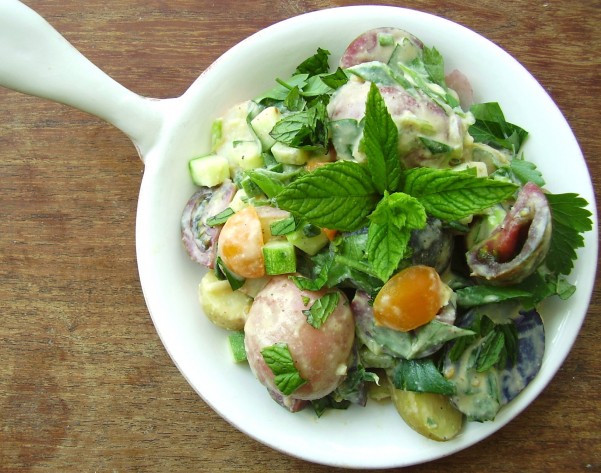lebanese potato salad
Makes 6 servings: 1 cup each
Potato salad is not traditionally Lebanese cuisine. But I was craving potato salad and Lebanese food—which is how this inspired recipe came to be. It’s a truly refreshing twist on the traditionally overly-caloric summertime favorite. This fragrant version is vegan, too. I adore this recipe. I hope you do, too!
Calories Saved: 240

2 pounds baby red or mixture of baby creamer potatoes, halved
3/4 teaspoon sea salt
3/4 cup classic hummus (homemade or favorite packaged version)
2 tablespoons freshly-brewed green tea, unsweetened, chilled
Juice and zest of 1 small lemon (2 tablespoons juice)
1 tablespoon extra-virgin olive oil
1 large garlic clove, minced
1/2 teaspoon harissa or garlic-chili sauce*
1/4 teaspoon freshly ground black pepper
1 (5-ounce) Kirby cucumber, diced, or 1 cup diced English cucumber
3 scallions, green and white parts, thinly sliced on the diagonal
4 ounces Heirloom or local cherry tomatoes, quartered lengthwise (3/4 cup)
1/4 cup packed chopped fresh flat-leaf parsley
2 tablespoons finely chopped fresh mint
- Place the potatoes in a large saucepan. Cover with cold water, add 1/4 teaspoon of the salt, place over high heat, and bring to a boil. Reduce heat to low and simmer uncovered until the potatoes are fork-tender, about 12 to 15 minutes. Drain, transfer the potatoes to a medium bowl, and chill.
- Whisk together the hummus, green tea, lemon juice, olive oil, garlic, harissa, black pepper, and the remaining 1/2 teaspoon salt until well combined in a large bowl. Add the potatoes, cucumber, scallions, tomatoes, parsley, half of the mint, and desired amount of the lemon zest and gently stir to combine. (Note: If preparing this recipe a day in advance, stir in the fresh parsley and mint just before serving.)
- Cover and chill for at least 2 hours to allow the flavors to marry. Adjust seasoning.
- Transfer the potato salad to a serving bowl, sprinkle with the remaining mint, and serve.
*If you’re following a gluten-free diet, some brands of harissa sauce contain gluten. Alternatively, use several drops of hot pepper sauce of choice.
Per serving: 190 calories, 5g total fat, 1g saturated fat, 0g trans fat, 0mg cholesterol, 380mg sodium, 31g total carbohydrate, 5g dietary fiber, 3g sugars, 6g protein
The “Before” Recipe
classic russet potato salad
Makes 6 servings
2 pounds Russet potatoes, peeled, cubed
1 cup mayonnaise
2 tablespoons white wine vinegar
1 1/2 teaspoons salt
1 teaspoon Dijon mustard
1 teaspoon honey or sugar
1/4 teaspoon black pepper, or to taste
3/4 cup diced celery
3/4 cup diced white onion
3 large hard-boiled eggs, chopped
2 tablespoons chopped fresh parsley (optional)
- Place the potato cubes in a large saucepan. Cover with cold water, place over high heat, and bring to a boil. Reduce heat to low and simmer until the potatoes are fork-tender, about 8 to 10 minutes. Drain, transfer the potatoes to a medium bowl, and chill.
- Stir together the mayonnaise, vinegar, salt, mustard, honey, and pepper in a large bowl.
- Add the potatoes, celery, onion, and eggs and stir to combine.
- Cover and chill for at least 2 hours to allow the flavors to marry.
- Transfer the potato salad to a serving bowl, sprinkle with the parsley (if using), and serve.
Per serving: 430 calories, 32g total fat, 5g saturated fat, 0g trans fat, 105mg cholesterol, 890mg sodium, 30g total carbohydrate, 3g dietary fiber, 3g sugars, 6g protein
Tasteover Tips
- Consider using a dip, like hummus, instead of part or all of the mayo in recipes for flavor interest
- When thinning a dressing or sauce, use a tasty calorie-free or low-calorie liquid, like unsweetened green tea
- Boost “heat” a bit with various chili pepper-based ingredients, like harissa sauce
- Add fragrant aroma with a generous amount of fresh herbs; be sure to add some on top of each serving as that’ll be closest to your nose
- Use seasonal, locally available ingredients when possible; hit your farmers’ market to find produce at its peak of ripeness, flavor, and color

















